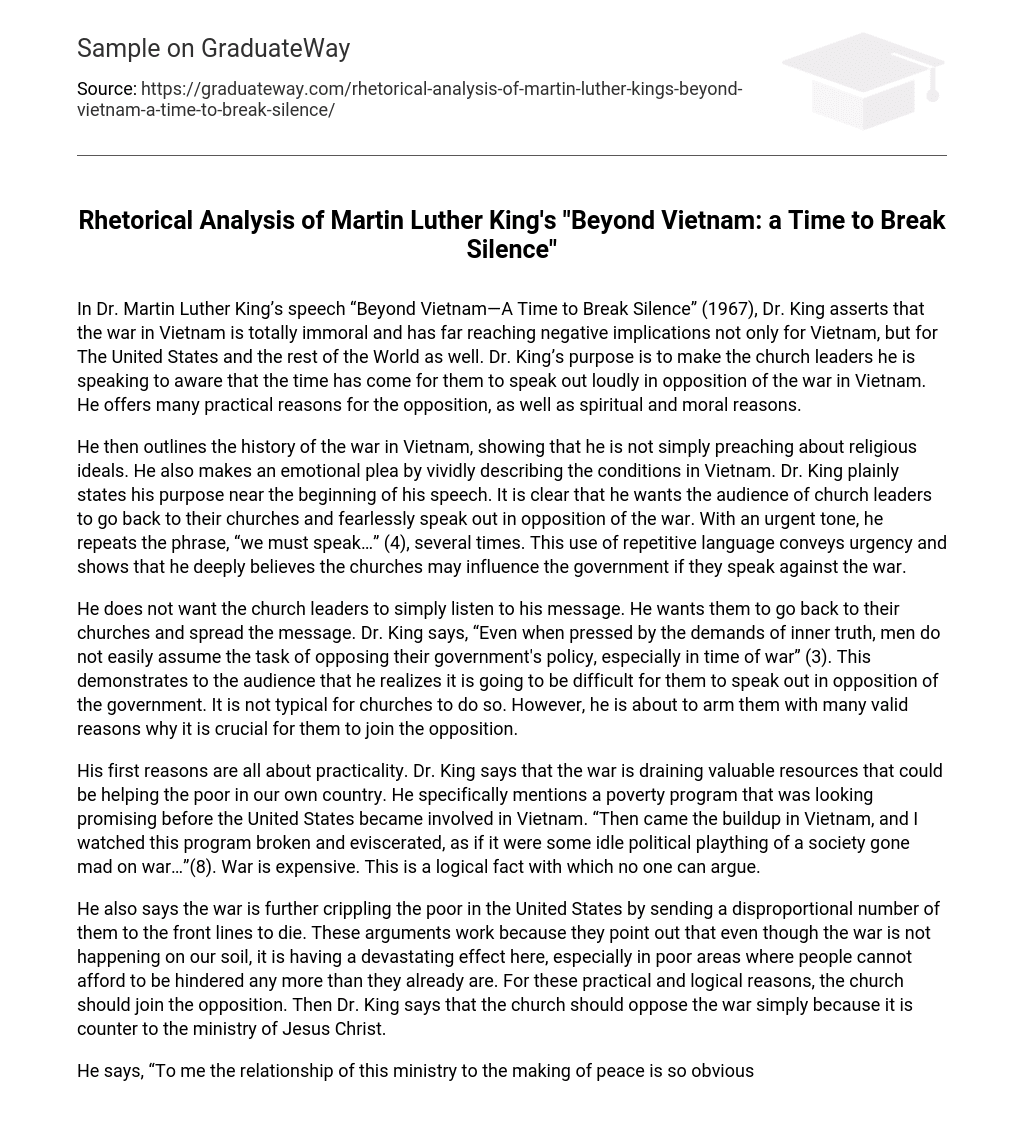In Dr. Martin Luther King’s speech “Beyond Vietnam—A Time to Break Silence” (1967), Dr. King asserts that the war in Vietnam is totally immoral and has far reaching negative implications not only for Vietnam, but for The United States and the rest of the World as well. Dr. King’s purpose is to make the church leaders he is speaking to aware that the time has come for them to speak out loudly in opposition of the war in Vietnam. He offers many practical reasons for the opposition, as well as spiritual and moral reasons.
He then outlines the history of the war in Vietnam, showing that he is not simply preaching about religious ideals. He also makes an emotional plea by vividly describing the conditions in Vietnam. Dr. King plainly states his purpose near the beginning of his speech. It is clear that he wants the audience of church leaders to go back to their churches and fearlessly speak out in opposition of the war. With an urgent tone, he repeats the phrase, “we must speak…” (4), several times. This use of repetitive language conveys urgency and shows that he deeply believes the churches may influence the government if they speak against the war.
He does not want the church leaders to simply listen to his message. He wants them to go back to their churches and spread the message. Dr. King says, “Even when pressed by the demands of inner truth, men do not easily assume the task of opposing their government’s policy, especially in time of war” (3). This demonstrates to the audience that he realizes it is going to be difficult for them to speak out in opposition of the government. It is not typical for churches to do so. However, he is about to arm them with many valid reasons why it is crucial for them to join the opposition.
His first reasons are all about practicality. Dr. King says that the war is draining valuable resources that could be helping the poor in our own country. He specifically mentions a poverty program that was looking promising before the United States became involved in Vietnam. “Then came the buildup in Vietnam, and I watched this program broken and eviscerated, as if it were some idle political plaything of a society gone mad on war…”(8). War is expensive. This is a logical fact with which no one can argue.
He also says the war is further crippling the poor in the United States by sending a disproportional number of them to the front lines to die. These arguments work because they point out that even though the war is not happening on our soil, it is having a devastating effect here, especially in poor areas where people cannot afford to be hindered any more than they already are. For these practical and logical reasons, the church should join the opposition. Then Dr. King says that the church should oppose the war simply because it is counter to the ministry of Jesus Christ.
He says, “To me the relationship of this ministry to the making of peace is so obvious that I sometimes marvel at those who ask me why I’m speaking against the war” (12). This is an obvious and extremely effective argument, especially among a group of Christian church leaders. Dr. King genuinely believes that the war is in direct opposition to the teachings of Christ and therefore the church must speak out in a united voice against it. Dr. King includes a brief, but poignant history of the war in Vietnam which is important because he needs to prove that he knows and understands the politics of the situation.
He successfully proves that The United States has done far more harm to the Vietnamese than good. If he had not shown knowledge of the background of the war, it would be easy to dismiss his other pleas as lofty religious ideals. Dr. King further discredits the United States’ intentions in Vietnam by comparing us to Germany in World War II saying, “What do they think as we test out our latest weapons on them, just as the Germans tested out new medicine and new tortures in the concentration camps of Europe? ” (21). This comparison is very sobering.
Nothing could be lower than being placed parallel to the senseless violence of Nazi Germany. Showing his knowledge of the history of the war and using it to discredit the United States’ reason for being there is crucial to Dr. King in developing his position. Perhaps the most convincing part of the speech is the emotional appeal. Dr. King paints a vivid, heart-wrenching picture of the devastation in Vietnam. In a solemn tone, he talks about their crops being destroyed and their water being poisoned, presumably referring to Agent Orange.
He talks about the innocent people killed in the crossfire, mostly children. “They wander into the towns and see thousands of the children, homeless, without clothes, running in packs on the streets like animals” (20). Nothing evokes a more emotional response than the image of children suffering or being killed. These emotionally charged images would seemingly convince anyone that the cause for this war could not possibly be just. All of Dr. King’s arguments are very effective. His pleas are first to the audience’s sense of logic and their immediate concerns for their own country.
He also reminds the church leaders of something seemingly obvious that they may have lost sight of: “…the Father is deeply concerned especially for his suffering and helpless and outcast children…” (13). Therefore, to remain silent would truly be betrayal. He then paints a picture of the suffering endured by Vietnam and tells how the United States has a long history of doing the wrong thing to this tiny country. All of the valid arguments and vivid imagery Dr. King uses combine to make this a very effective, passionate and memorable speech.





